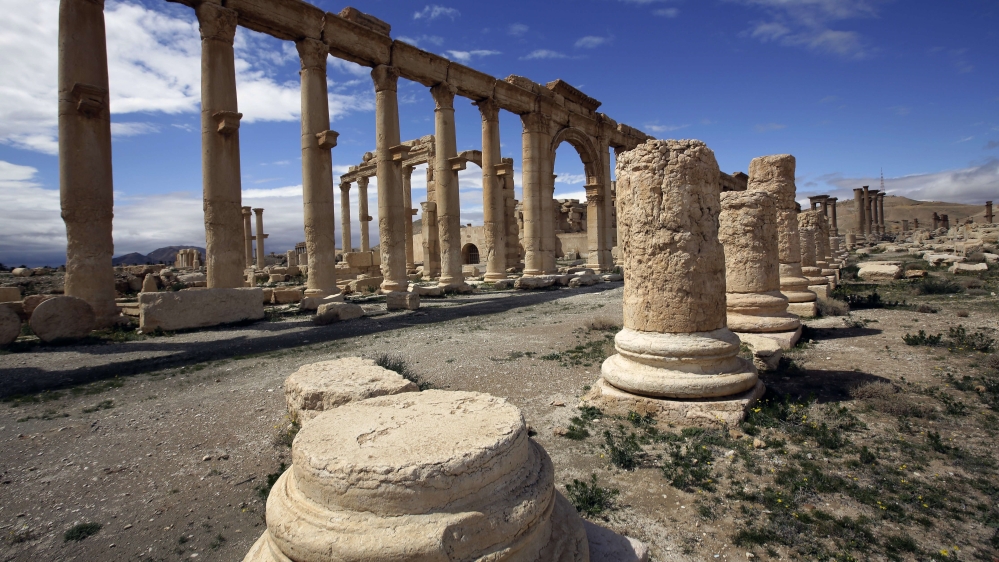Syrian government forces reportedly launched 17 airstrikes in and around Palmyra on Monday morning, following a Syrian Observatory of Human Rights (SOHR) report that says IS has executed at least 217 people in the past nine days in the ancient city of Palmyra.
The Observatory said on Sunday that it had documented the executions of at least 217 people, among them 67 civilians, including 14 children.
”The majority of the passings were in Palmyra, a percentage of the executions were shootings, others were slaughtered with blades and beheaded,” Observatory director Rami Abdel Rahman told AFP.
Mohamed Alkhatab, an activist from Palmyra’s local coordination committee, told Middle East Eye that 15 people had been killed and 30 injured by the air raids on Monday.
“Air raids targeted the security branch and the Palmyra military prison, the area around the hospital and the centre of the city,” he said.
He said the strikes also targeted the ruined area of Palmyra castle.
IS’s takeover of the ancient Syrian city has been seen as a major victory for the organisation and a symbolic blow to anti-IS actors.
Fears that IS might demolish the city, which is a UNESCO world heritage site, due to their ideological policy of destroying pre-Islamic “idolatrous” artefacts, has raised the profile of the takeover.
Syria’s antiquities chief said on Saturday that IS had entered the Palmyra museum and “broke some plaster statues… that were being used to represent life in prehistoric eras.”
“There’s almost nothing left in the museum, we had been progressively transferring the antiquities to Damascus,” said Mamoun Abdulkarim, speaking to AFP following a press conference in Damascus.
“But there are still the large items, like the sarcophagi, which weigh three or four tonnes and we could not move, those are what worry me.”
As of yet, however, there have been no reports of wide-scale destruction of antiquities by IS.
“The ruins area is now closed off by IS, no-one can go there,” said Alkhatab.
He said that prior to Monday’s airstrikes IS had not engaged in widespread destruction of the city, quoting one civilian in Palmyra who had been told by an IS commander that the group promised not to destroy the anqituities.
“I do not think they will do anything to damage the ruined city,” Alkhatab told MEE.
IS, which seized control of Palmyra on Thursday, issued a statement issued on Twitter, saying it took Palmyra “after the collapse of the Nusayri regime’s forces and their retreat, leaving behind them large numbers of dead that have filled the battle grounds” referring to the Syrian government by the derogatory term for Alawites.
Residents of Palmyra told Middle East Eye last week that they feared the international consequences of an IS takeover of the area.
“We are not afraid of IS,” said one inhabitant, Tareq Ahmad. “We are afraid that if IS take control, then Assad will bomb us, and the Americans.”
Another resident, Saleh Dukhan, agreed with the sentiment.
“We are afraid of both sides taking revenge,” he told MEE. “If IS take control then they will take revenge on the people for siding with the regime. If the regime takes control they will take revenge on the people for siding with IS.”
‘No will’ in Iraqi army
The seizure of Palmyra comes shortly after the group seized the city of Ramadi in Iraq, solidifying their control over the country’s Anbar province.
On Monday, Pentagon chief Ashton Carter told CNN that the defeat showed up fundamental flaws in the Iraqi army.
“What apparently happened was the Iraqi forces showed no will to fight,” he said. “They were not outnumbered, and they vastly outnumbered the opposing force, and they failed to fight and withdrew from the site.”
“That says to me, and I think to most of us, that we have an issue with the will of the Iraqis to fight ISIL and defend themselves,” he said, using another name for the group.
American pop singer Cher also weighed into the debate on Sunday, tweeting that the US should arm the Kurdish forces and chastising Washington for failing to back-up Anbar tribal leaders after they drove al-Qaeda out of the province in 2007. A US-led coalition has been involved in targeting IS with airstrikes in both Iraq and Syria since August 2014.






 WhatsApp us
WhatsApp us 

